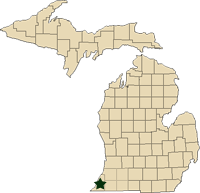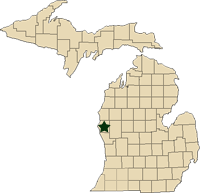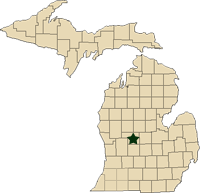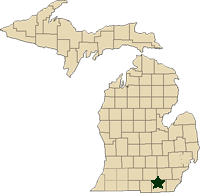Regional reports on Michigan vegetables – May 23, 2012
MSU Extension educators’ pest and vegetable updates for Michigan.
This week’s regional reports:
- Southwest Michigan – Ron Goldy
- West Central Michigan – Norm Myers
- Central Michigan – Fred Springborn
- Southeast Michigan – Lina Rodriguez Salamanca
Southwest Michigan – Ron Goldy, Michigan State University Extension
|
Weather
High temperatures for the week ranged from 64 to 91°F and lows from 43 to 63°F. Soil temperatures continue to be in the mid-60s. Precipitation for the area was around 0.5 inches. Soil moisture is getting low. The period was also quite windy, restricting spray activities to evening and early morning.
Crop reports
Asparagus harvest is complete on some fields and growers are applying herbicides. Harvest will continue on some fields into next week.
Early planted peas have 3-inch pods and pods are beginning to swell.
Early planted sweet corn is at the four-leaf stage and subsequent planting continues.
Pepper and eggplant transplanting has begun.
Summer squashes, zucchinis and cucumbers under low tunnels are in bloom and tunnels are being removed. Harvest from summer squashes and zucchinis should begin next week. Direct seeding in unprotected fields continues.
Tomatoes under tunnels are in bloom and tunnels are being removed. Transplanting in unprotected fields continues.
Potatoes are 6 inches tall. No significant Colorado potato beetle levels have been observed.
West Central Michigan – Norm Myers, Michigan State University Extension
|
Weather
Soils are getting pretty dry in most parts of western Michigan. Except for a few isolated spots, less than half an inch of rain fell overnight Sunday into Monday (May 20-21). Irrigation is being used where available, especially on carrots and peas. Temperatures have whipsawed from very warm on Sunday to chilly on Tuesday morning (May 22). High winds have caused some problems for spraying the last couple of days.
Oceana, Newaygo and Mason counties
Harvest of asparagus continues and growers figure to be at or past the mid-point in the season by the end of the week. Wind-blown sand caused some spear crooking and high temperatures and dry soil conditions have caused a few light pickings. Irrigation is being used on asparagus where available.
Carrots still look good and required very little re-planting this year. Growers have begun planting winter squash and some early processing zucchini will go into the ground this week, but growers will need a rain or irrigation to germinate these crops. Peas are in bloom in the Fremont, Mich., area.
Muck vegetable growing areas in Ottawa, Kent and Newaygo counties
Some replanting of onions was required due to what appears to have been seed corn maggot damage, although some seed treatments appear to have been effective in preventing damage.
Celery planting continues and tunnels on early-planted celery have already been removed. Even though aster yellows infectivity is much lower in this area than in Oceana and Mason counties, numbers of the pest are so high that growers had to put an insecticide on celery because even the higher thresholds were reached.
Central Michigan – Fred Springborn, Michigan State University Extension
|
Weather
Dry weather dominated much of the week as many areas received 1/10 inches or less from Monday’s (May 21) rain. High air temperatures ranged from 70 to near 90°F on Sunday (May 20). Low air temperatures ranged from 33.5°F on Thursday (May 17) to near 60°F the following Sunday. Low soil temperatures at 2 inches are in the mid-50s to low 60s. Average relative humidity levels have been in the mid-50s down to low 40s every day this week except Monday. Irrigation systems are running in many crops.
Crops
Potato planting is still taking place mostly on schedule with a few growers finishing up planting chip potatoes that will go into storage this fall. Early planted potatoes are emerged with good stands; many fields planted in early May are emerging this week.
Many small scale vegetable growers are transplanting tomatoes and other frost-sensitive plants this week.
I caught no armyworm moths this week in pheromone traps in Montcalm County, nor did I catch any black cutworm moths this week. I did, however, capture a few European corn borer moths while scouting a wheat field. This pest may be worth monitoring in susceptible vegetable crops this season as its emergence is ahead of normal this year and its primary host (field corn) is, and will be for a few weeks yet, unattractive for egglaying. My European corn borer pheromone trap will go up this week.
Southeast Michigan – Lina Rodriguez Salamanca, Michigan State University Extension
|
Weather
At Enviro-weather’s Petersburg station, we currently have reached 563 degree days (base 50°F). This means we are two weeks ahead in heat accumulation – around 200 degree days – than the average of the last five years. This is especially important for insect population and scouting is recommended for key insect pests.
Crops
Cucurbit downy mildew counts at the Frankenmuth, Mich., site have slowly but steadily increased. The count for the Monroe station will soon be posted online. Cucumbers and melons are the crops at risk. For more information and current recommendations, see Mary Hausbeck’s article on Influx of cucurbit downy mildew sporangia detected in eastern Michigan, as well as the Hausbeck lab website.
First radish harvest is ongoing. Direct-seeded cabbage has germinated. No crucifer downy mildew has been found in the field so far. However, potential adult cabbage maggots or corn maggots were observed on fields with two to five leaf-cabbage plants. Further identification will be conducted. It is important to remember that despite these two maggot adults looking alike, their degree day models and chemical management options are different.
There is low risk of late blight of potatoes in the southeastern part of the state. At the moment, the potato plants scouted (5-inch tall) are not showing any symptoms.



 Print
Print Email
Email






